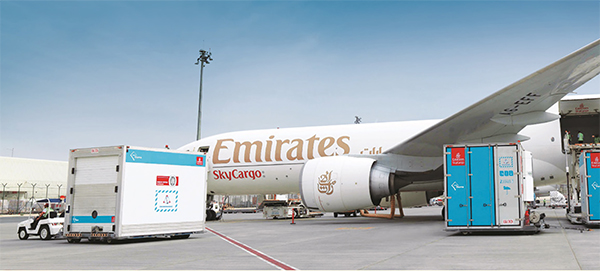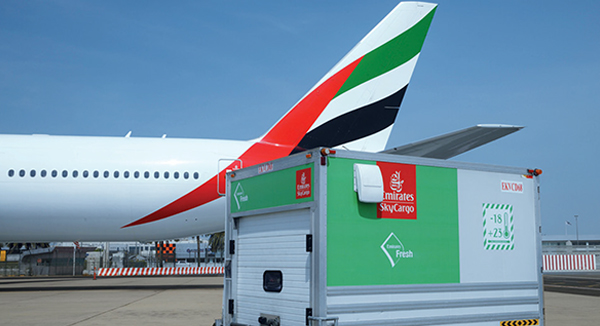
The year 2020 was shaped by the COVID-19 pandemic and pharma being at the forefront of efforts to combat the virus was vulnerable and also impacted by the lockdown. How did the pandemic impact EKSCand what steps did you take to deal with it?
The COVID-19 pandemic had a massive impact on the aviation and air cargo industry globally. As part of our normal business, we transport cargo on dedicated freighter aircraft and also in the bellyhold of our passenger flights. The latter plays quite a key role as prior to COVID-19, around 70 per cent of the total freight we transported were carried on passenger aircraft. When COVID-19 forced the complete suspension of passenger flight operations in late March, this entire capacity suddenly was no longer available to us and we were left only with operations on our 11 Boeing 777 freighter aircraft.
At this point of time, worldwide, there was still demand for the transportation of cargo. This covered goods that were urgently required by people across the world- PPE, medical equipment such as ventilators, pharmaceuticals as well as food items. Given the distributed nature of the global economy, these critical commodities needed to be transported from the markets where they had been produced to communities across the globe. And so, we had to innovate very quickly, almost reinvent our complete business model overnight and ensure that we were fulfilling our social responsibility by transporting these urgently required commodities across the world.
Our main response was focused on two streams- streamlining our operations here at Dubai and making additional air capacity available to our customers for transport of essential goods through Dubai to the rest of the world.
As restrictions on international travel exposed frailties in supply chains & lockdowns, we could foresee a situation where there would no longer be adequate cargo capacity available in the market to transport essential supplies. How did you overcome such a situation?
Our first order of business was to restore air cargo connectivity to markets around the world so that we could continue transporting essential commodities that were required in the response to COVID-19.
In order to do this, we started operating our Boeing 777-300ER passenger aircraft as cargo only aircraft. This had never been done before and our team had to work within a very short time to plan our new route network, work with our partners across the world and also work with the relevant authorities to get the required permissions to operate the flight. Our Boeing 777-300ERs are widebody aircraft with around 40-50 tonnes of bellyhold capacity (without passengers).
We were able to deploy these and increase our destination network from about 35 (served by our 11 Boeing 777 freighters) at the end of March to around 50 by April. Over the next two months, we further increased our network to more than 75 destinations. Currently we’re flying to more than 130 destinations across six continents.
In the meantime, we also came up with other innovative solutions to increase the amount of air cargo capacity. This included loading cargo on the seats of passenger aircraft and in the overhead bins. Of course, before we introduced this, we also had to make a complete safety evaluation and develop guidelines for our worldwide team to follow. All this was done in an extremely short period of time as the market continues to evolve rapidly.
In the month of June, we also removed seats in Economy Class from 10 Boeing 777-300ER aircraft to convert them into what we like to call ‘minifreighters’. We now have 16 of these aircraft in our fleet to complement the air cargo capacity that we offer on our full freighters and passenger aircraft.
What innovative strategy did you come up with to bolster the cargo capacity?
We reacted quickly to changing circumstances and have endeavoured to maintain trade lanes across the world during these challenging times with our flights.
Our most important change to operations during the COVID-19 crisis was to operate our passenger aircraft as cargo only to maintain connectivity for essential goods including medical supplies, pharmaceutical cargo and food. Over one year, we operated more than 27,800 cargo only flights on passenger aircraft, transporting more than 100,000 tonnes of food and pharma on these flights.
We also operated a record number of charter flights as and when requests came in from our customers for transporting critical commodities. The investment in our modern aircraft fleet, infrastructure at our hub and development of processes, helped us stand the test and face extremely difficult market conditions.
In terms of our hub operations, in early April, we decided to consolidate all our cargo handling operations at Dubai International Airport (DXB) from our previous dual airport hub model with both DXB and DWC with the latter handling cargo transported on the Boeing 777 full freighter aircraft. Given the reduced number of passenger flights, we were able to streamline our processes with all flights taking off from DXB.
However, we have had a finger on the pulse of the market and started preparing very early on for the eventual transportation of COVID-19 vaccines. Since late 2020, we have been flying these much needed vaccines on our flights and so far we have transported more than 75 million doses of COVID-19 vaccines to more than 60 cities on 250 flights, mostly to developing countries. We have a dedicated GDP certified COVID-19 vaccine hub in Dubai and have also partnered with entities in Dubai and with international organisations such as UNICEF to be able to expedite the movement of COVID-19 vaccines through Dubai to developing countries.
Emirates Sky Cargo marks a year of PAX-freighter flights. What are some of the hurdles in operating a cargo-only flight as a passenger aircraft, and what factors do you attribute the success to?
Prior to the COVID-19 pandemic, no air cargo carrier including Emirates SkyCargo had operated a cargo only flight on a passenger aircraft. Passenger freighters came into play only because of the severe capacity crunch in the global market for the transport of urgently required PPE, medical equipment, pharmaceutical supplies and food.
Setting up passenger freighter operations on a global scale was a complete shift in our usual business model and this meant that our teams had to work from the ground up, getting approvals for flight operations from various authorities, drawing up a destination network and schedule based on demand for cargo in the various markets, evaluating and drawing up new operational safety guidelines and working closely with our ground handlers across the different markets we operate for any additional resources and equipment required for cargo loading/ offloading especially in cases where cargo is required to be loaded inside the aircraft cabin.
Over a period of one year from 16 March 2020, Emirates SkyCargo operated more than 27,800 cargo only flights on its fleet of widebody passenger aircraft. This was by far the most number of passenger freighter flights operated by a single carrier in the industry. We attribute our success to the fact that we have been agile and kept an open mind, working closely with our customers and responding quickly to the rapidly evolving market dynamics. Of course, none of our successes would be possible without the support and hard work of our teams and our partners around the world.

How would EKSC’s partnership with UNICEF act as a blueprint for collective global partnership in the face of future health and humanitarian crises?
Emirates SkyCargo has over two decades of expertise in transporting pharmaceuticals, vaccines and other relief materials. We also have experience working with various international organisations to help deliver relief efforts. Over the years, we have deployed many charter flights on our Boeing 777F aircraft transporting aid and relief materials to areas impacted by humanitarian crises including natural disasters.
One of our strongest partners is the International Humanitarian City (IHC) located in Dubai who are the world’s largest humanitarian hub based in Dubai. Emirates SkyCargo has worked closely with IHC to operate humanitarian flights. In October 2020, we also signed an MoU with IHC to combine our mutual but complementary expertise to deploy relief efforts more rapidly and effectively across the world. The IHC are also one of our partner organisations in the Dubai Vaccine Logistics Alliance and our primary aim is to use our Dubai hub to rapidly distribute COVID-19 vaccines from manufacturing locations to the rest of the world.We are also working with UNICEF to support the COVAX facility by expediting shipments of COVID-19 vaccines on our flights. So far, we have flown more than 75 million vaccines on our flights.
We feel that it is our social responsibility to use our expertise in logistics to help communities across the world stay connected to the goods they require.
What according to you is the greatest lesson learned from the COVID-19 pandemic, and what lasting effects do you foresee over the next 5–10 years?
If there is one lesson that COVID-19 has taught us it is that we must always stay on our feet. We cannot become complacent just because we have developed the best product or solution. The pandemic has demonstrated to us that even the most carefully laid out plans can be changed overnight. The only option is to work closely with our customers, continuously innovate and stay ahead of the game.
The aviation and air cargo industry are currently still coping with the effects of the pandemic. However, one thing that the pandemic has done is to encourage outside the box thinking. We have implemented measures that we thought were never possible before- such as operating cargo only flights on passenger aircraft or loading of cargo on the seats of the aircraft. The industry that emerges from the crisis will be much more responsive, agile and resilient in dealing with such worldwide disruptions.